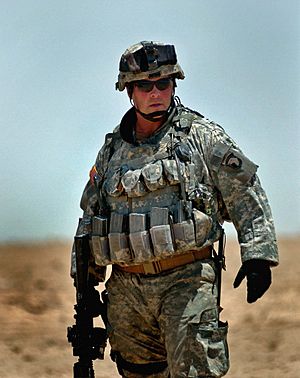Michael D. Steele facts for kids
Quick facts for kids
Michael D. Steele
|
|
|---|---|

Col. Michael Steele, commanding 3rd BCT, 101st Airborne during Operation Starlite in Salah Ah Din province, Iraq
|
|
| Born | September 15, 1960 Statham, Georgia, U.S. |
| Allegiance | United States |
| Service/ |
United States Army |
| Years of service | 1983–2010 |
| Rank | Colonel |
| Commands held | A Company, 4th Battalion, 27th Infantry Regiment B Company, 3rd Battalion, 75th Ranger Regiment 3rd Brigade, 101st Airborne Division 2nd Battalion, 22nd Infantry Regiment |
| Battles/wars | Operation Just Cause Operation Gothic Serpent Operation Joint Guardian War in Afghanistan Iraq War |
| Awards | Legion of Merit Bronze Star Medal Purple Heart Meritorious Service Medal |
Michael Dane Steele (born September 15, 1960) is a retired Colonel from the United States Army. He was a company commander during the Battle of Mogadishu (1993) in Somalia. This event was later featured in a famous book and film called Black Hawk Down. Actor Jason Isaacs played him in the movie. Colonel Steele also appeared briefly in the documentary I Am an American Soldier.
Contents
Early Life and Military Training
Michael Steele was born on September 15, 1960, in Statham, Georgia. This is a small town in the southeastern United States. He went to the University of Georgia where he played football. He was an offensive lineman for the Bulldogs football team. In 1980, his team won the national championship.
After graduating in 1983, Steele became an infantry officer through the Army ROTC program. His first job was with the Berlin Brigade in West Berlin. He later earned a master's degree from Central Michigan University. His military training included Airborne School and Ranger School.
Operation Gothic Serpent: A Difficult Mission
In August 1993, Captain Steele went to Mogadishu, Somalia. He was leading a rifle company as part of Task Force Ranger. This group included different special operations forces units. Their goal was to capture a Somali warlord named Mohamed Farrah Aidid.
On October 3, 1993, Task Force Ranger learned that two of Aidid's leaders were in central Mogadishu. The task force sent 19 aircraft, 12 vehicles, and 160 soldiers to arrest them. Captain Steele used a rope to slide down from a UH-60 Black Hawk helicopter into the Bakara Market. The mission was supposed to take only 30 minutes.
However, two MH-60 Black Hawk helicopters were shot down. This changed the mission completely. Captain Steele's Rangers and other special forces soldiers protected the crash site of one helicopter. They fought against many armed people throughout the night.
After 15 and a half hours of intense fighting, armored vehicles arrived to help them leave. The Rangers continued to protect the convoy as they fought their way to safety. They reached a United Nations forces base. This battle was very tough, with many soldiers injured or killed. Captain Steele received the Bronze Star Medal for his brave actions during this fight.
Leading in Iraq: Operation Iraqi Freedom
From June 2004 to November 2006, Colonel Steele commanded the 3rd Brigade (Rakkasan) of the 101st Airborne Division. During his time as commander, he helped change the unit. It became a larger and more modern fighting team.
Steele and his brigade went to Iraq in the fall of 2005. They mostly operated in the Saladin Governorate area. In March 2006, the brigade planned and carried out Operation Swarmer. This was a joint U.S.-Iraqi air assault operation. It targeted insurgents in the desert northeast of Samarra. The U.S. military said it was the largest air assault in Iraq since the war began in 2003.
His brigade also conducted many other operations. These included Operation Katrina, Operation Rita, and Operation Swift Sword. In November 2006, Colonel Steele finished his command of the 3rd Brigade. He then moved to a new role at Fort McPherson, Georgia. There, he helped coordinate training for Army forces in the United States.
Investigation and Reprimand
During his time in Iraq, Colonel Steele was investigated regarding how orders were given during an operation. Some soldiers said that his instructions were misunderstood. Colonel Steele stated that he did not give orders to harm unarmed people. He was not charged with any crime. However, he received a formal reprimand from Lieutenant General Peter W. Chiarelli. This reprimand affected his chances for future promotions in the army. The details of the reprimand were not made public.
Images for kids
 | John T. Biggers |
 | Thomas Blackshear |
 | Mark Bradford |
 | Beverly Buchanan |


